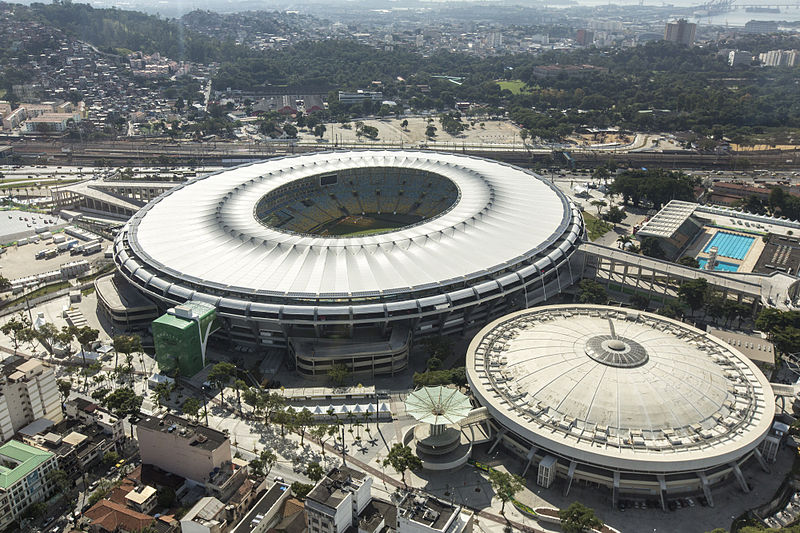When you think of the Olympic Games, soccer may not be the first sport to come to mind. But this year, the games will be played in soccer-mad Brazil.
The Olympic soccer tournament will be played from August 3 through August 20 and, unique among major soccer events, will feature both men’s and women’s teams from around the world.
The men’s draw features 16 teams. On the men’s side, players must be under 23 years old, with only three roster spots available for players over 23. Teams qualified through tournaments in all six of the FIFA continental confederations. Qualifying teams have been broken into four groups, and the top two teams in each group will make the quarter-finals.
While the United States men will not play, many men’s soccer powerhouse nations – including hosts Brazil, Argentina, Germany, Portugal and Mexico – will participate. Mexico is the reigning gold medal winner, as they beat Brazil in the 2012 men’s final in London.
The men’s medal winning teams from recent years show a bit more diversity than recent World Cup winners. South Korea won the bronze medal in 2012. Argentina won gold in both 2008 in Beijing and 2004 in Athens. African teams have also had some success, as Nigeria won the silver in 2008 and the gold in Atlanta in 1996, and Cameroon won gold in 2000 in Sydney.
The U.S. women’s national team will be one of 12 squads participating in this year’s women’s tournament. There are no age restrictions on women’s teams, so the full squad is available for selection. There will be three groups, with the top two teams in each group, and the top two third place teams, advancing to the quarter-finals.
The U.S has been dominant in the Olympic games since the inclusion of women’s soccer in 1996. They’ve won gold in every Olympic competition except for Sydney 2000, when they won silver after a loss in the title game to Norway. The U.S. beat Japan 1-0 in the 2012 gold medal match, with Canada taking the bronze. The final was played at London’s Wembley Stadium in front of more than 80,000 spectators.
In 2012 Olympic soccer was held at a number of venues throughout Great Britain. In addition to Wembley, games were played at Old Trafford in Manchester, St. James Park in Newcastle, City of Coventry Stadium, Hampden Park in Glasgow, Scotland, and Millennium Stadium in Cardiff, Wales.
This year’s tournament will be played in six stadiums spread throughout Brazil. Five of the six stadiums were used in the 2014 World Cup, the exception being the Estadio Olimpico Joao Havelange in Rio de Janiero. It was completed in 2007 and is the home stadium for local club Botafogo. The 60,000-seat stadium was closed from 2013-2015 for renovation, as its roof was declared to be structurally unsound, but it will host both soccer and track and field events at this summer’s games.
Three stadiums specifically built for the 2014 World Cup will be in use, including the Arena Corinthians in Sao Paulo, the Itaipava Arena Fonte Nova in Salvador, and the Arena Amazonia in Manaus. Additionally, the Mineirão in Belo Horizonte and the Estádio Nacional Mané Garrincha in Brasilia, both renovated prior to the World Cup, will also be in use.
Both the men’s and women’s gold medal matches will be played at Rio De Janiero’s Maracana stadium. The 75,000 seat venue, which also hosted the final of the 2014 men’s World Cup, will also be the site of this year’s Olympic opening and closing ceremonies.
In the United States, NBC will broadcast soccer as part of its overall Olympic coverage. Marquee games, including those of the USWNT, will be broadcast on NBCSN, and other games will be spread across other NBC platforms, and can be streamed at NBCOlympics.com.
Due to the age restrictions, and club and international commitments precluding some of the biggest name stars from participating, the Olympic squads may not be as familiar on the men’s side as a World Cup, or recent regional championships. The women’s tournament, however, will be another chance to see the dominant U.S. women against the world’s best competition.
In any case, the Rio Olympics, held in the nation that loves soccer above all, promises fans another chance to see some meaningful and high quality international soccer this summer.
Image: Maracana Stadium.

